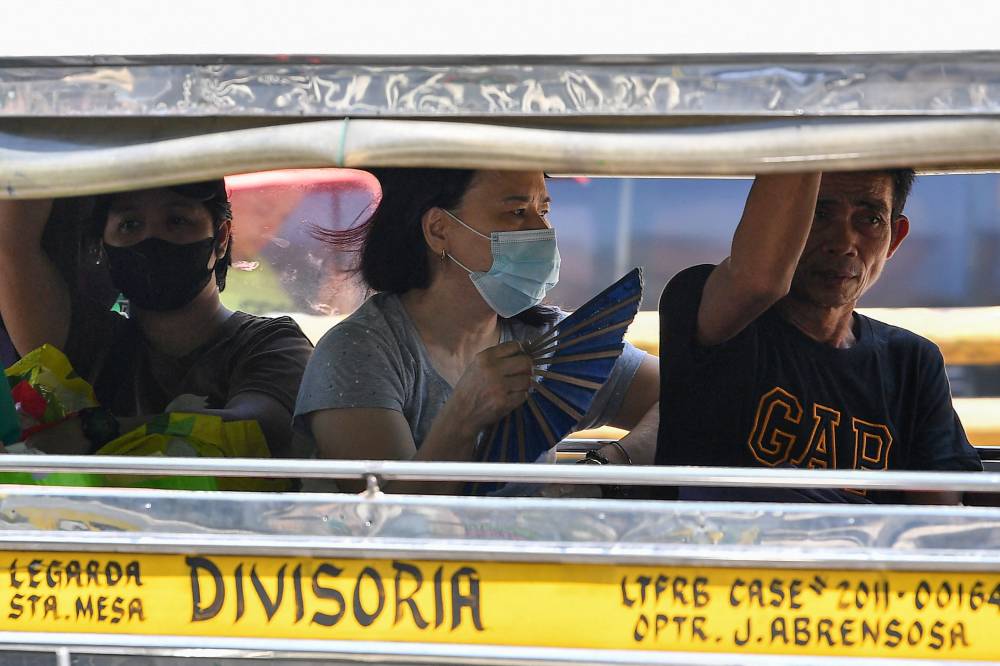Palace to critics of mandatory drug test for drivers: Too early to judge

A woman cools off with a folding hand fan inside a passenger jeepney in Manila on April 25, 2024. (Photo by Ted ALJIBE / AFP)
MANILA, Philippines — A Palace official on Tuesday urged the public to refrain from hastily judging the new policy requiring all public utility vehicle (PUV) drivers to undergo drug testing every 90 days.
Palace Press Officer Claire Castro noted that the measure is still subject to further study.
Castro is responding to the criticism of the measure by former Senate Presidents Vicente Sotto III and Aquilino “Koko” Pimentel III, and transport group Pagkakaisa ng mga Samahan ng Tsuper at Operator Nationwide (Piston).
“Hindi po ito basta basta maaaring sabihin na huwag na lang gawin kung ito naman po ay makakasama sa safety,” Castro said at a press briefing.
(We can’t simply say it shouldn’t be done if it can be bad for safety.)

“So, pag-aaralan pa rin po ito at huwag naman natin agad husgahan na ito ay isang money-making device or strategy,” she noted.
(So, this will still be studied, and let’s not immediately judge it as a money-making device or strategy.)
She emphasized that the mandatory drug testing was intended for the safety of drivers, commuters and all road users.
Sotto, in a social media post earlier in the day, said mandatory drug testing may just be a money-making scheme.
The former Senate leader cited previous data that showed only a small percentage of PUV drivers tested positive for drug use.
READ: Sotto, Pimentel don’t see need for PUV drivers’ mandatory drug tests
Pimentel, for his part, questioned why drug testing was being considered when the Solid North bus driver involved in the Subic-Clark-Tarlac Expressway (SCTEx) collision did not test positive for illegal drugs.
Meanwhile, Piston expressed concern that the policy might negatively impact the drivers’ income and how it seemingly places the blame for road mishaps on drivers.
READ: PUV drivers mandated to undergo drug testing every 90 days – Dizon
“Ang sapilitang drug testing, lalo na kung ipapatupad nang walang sapat na proteksyon o support system, ay mas nakatuon sa paniniktik at kontrol kaysa tunay na kaligtasan,” it said in a Facebook post on Monday.
(Mandatory drug testing, especially if enforced without adequate safeguards or support systems, leans more toward surveillance and control rather than on genuine safety.)
This was the same day Transportation Secretary Vince Dizon announced the enforcement of the measure.
“Itinuturing nito ang mga tsuper bilang mga suspek sa halip na mga manggagawa o propesyunal,” the group added.
(It treats drivers as suspects rather than as workers or professionals.)
“Binabale wala nito ang kanilang mababang kita, masamang kundisyon sa trabaho, at kakulangan ng suporta mula sa estado,” it noted.
(It disregards their low income, poor working conditions, and the lack of state support.)
“Lalong masaklap – ipinatutupad ito habang nagpapatuloy ang krisis dulot ng PUV modernization program — na nagtanggal na sa libu-libong tsuper at maliliit na operator sa kabuhayan,” it added.
(Even worse, it is being implemented while the ongoing crisis brought about by the PUV modernization program continuous — which has already displaced thousands of drivers and small operators from their livelihoods.)
Dizon’s announcement came following the loss of a dozen lives in the tragedies at the SCTEx toll plaza and Ninoy Aquino International Airport Terminal 1.